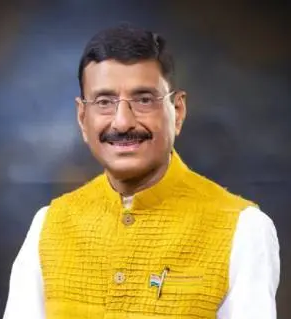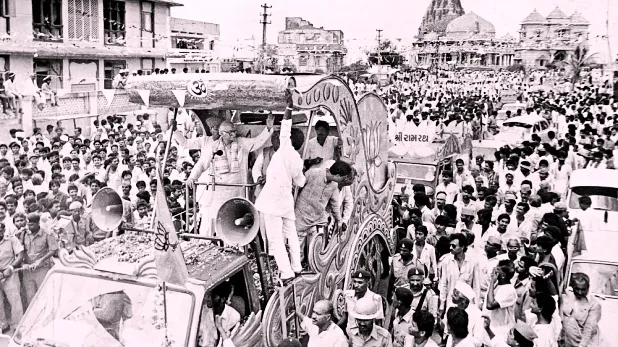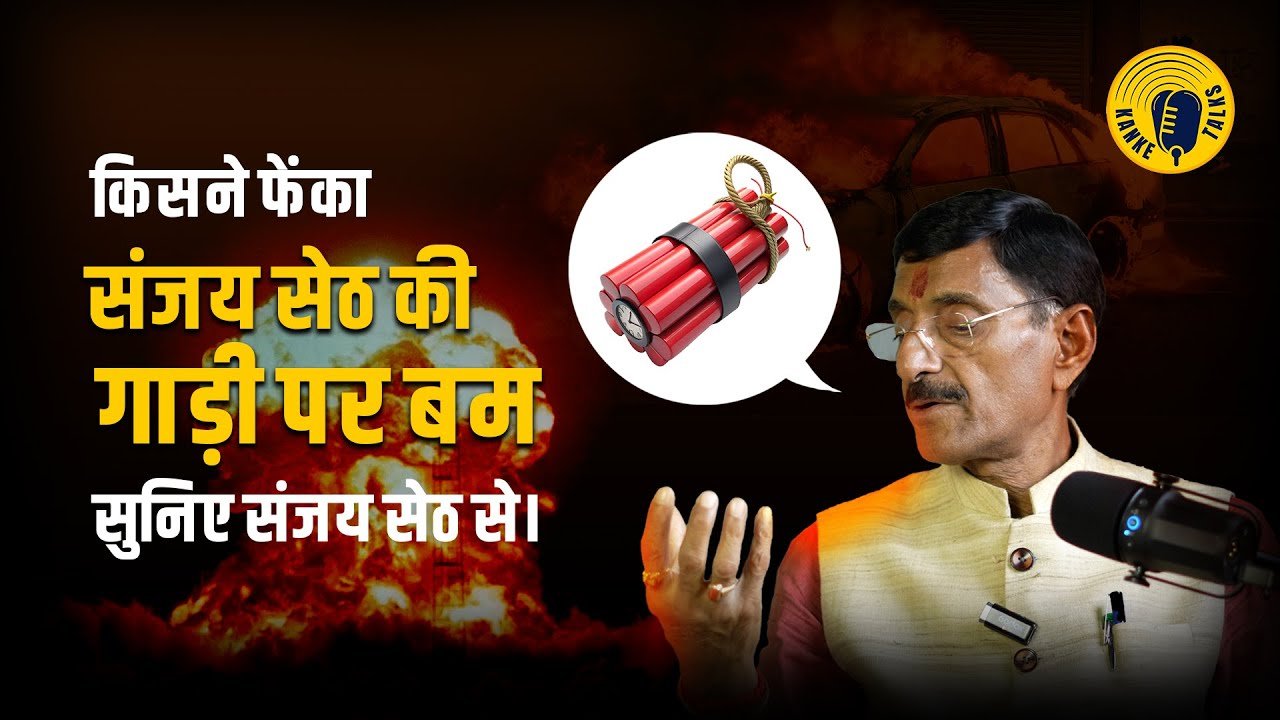“Because every story deserves to be told“
Behind every public figure lies a journey shaped by struggle, perseverance, ideals, and the voices that echo within. In Inspiration – Volume 1: The Voice Within, Sanjay Seth, the Minister of State for Defence, offers a deeply personal reflection on his 50-year-long political voyage—one that intersects with some of India’s most turbulent and transformative moments. In a candid and nostalgic conversation, he unravels the fabric of his life—a fabric woven with rebellion, sacrifice, faith, and an undying commitment to public service.

Roots of Revolution: A Fire Ignited in Youth
Sanjay Seth’s political awakening began in 1974 as a teenage boy caught in the whirlwind of Jayaprakash Narayan’s “Total Revolution.” As a matric student, he found himself not in the comfort of academic pursuit, but in the throes of a political uprising that demanded transformation from the grassroots. The allure of revolution and the injustice of authoritarianism pushed him onto the streets of Patna, where the movement bloomed.
One particular memory still burns vividly in his mind: a bomb attack on Dak Bangla Road while he was on a truck with fellow revolutionaries. Injured and in chaos, he chose Gandhi Maidan and JP’s speech over his own safety—capturing the spirit that would define his life.
The Atal-Era and the Rise of the BJP
The seeds planted in the JP movement later sprouted into Sanjay Seth’s deep involvement with the Bharatiya Janata Party (BJP). In 1980, the era of ideological realignment dawned. Atal Bihari Vajpayee and Lal Krishna Advani’s vision for a nationalist, service-oriented party resonated with him.
As a youth leader, Seth traveled extensively—sometimes sleeping under the stars, attending rallies, often riding scooters with banners in hand. These were not mere political chores, but spiritual missions. He recounted how his colleagues even sold personal belongings, like an ambassador car, just to organize events for Atal ji in Ranchi. When Atal ji got drenched during a rain-soaked rally but refused to leave the stage, it was a metaphor for the grit and undying connection between leaders and people.
Struggle on the Streets: Roads, Khichdi, and Justice
Sanjay Seth’s brand of politics was never confined to boardrooms. His most poignant memories are rooted in street struggles. In the early 1980s, he blocked roads, staged sit-ins, and cooked khichdi on makeshift stoves in the middle of highways to protest poor infrastructure. He recounts laying boulders with his own hands to force the government to act. These were not symbolic gestures—they resulted in permanent solutions like Ranchi’s first elevated road.
His deep engagement with local issues—roads, water, safety—defined his style. It wasn’t about optics, it was about results.

Ram Mandir Movement: Faith, Fire, and Jail
Sanjay Seth’s political identity is also inextricably linked to the Ram Janmabhoomi movement. He participated in the Shila Pujan ceremonies and was part of L.K. Advani’s iconic Rath Yatra. He recalls being arrested, jailed, and tear-gassed. His incarceration during the 1992 Ayodhya movement is something he doesn’t lament—it was a badge of honor.
He stood firm on 6 December 1992, witnessing the structure collapse, the military intervention, the chaos, and the stampede. Yet, amidst the smoke and uncertainty, what endured was faith—a belief that one day, a grand temple for Shri Ram would stand in Ayodhya. That belief, he says, crystallized when Narendra Modi became Prime Minister.
The Modi Era: India Reimagined
In Sanjay Seth’s eyes, Narendra Modi is not just a political leader—he is a transformative force. Whether it is the abrogation of Article 370, India’s swift response during the Ukraine-Russia war, or the global recognition of Indian diplomacy, Seth attributes these breakthroughs to Modi’s leadership.
He marvels at how the tricolor became a shield for students fleeing warzones, and how India’s image has shifted from a hesitant player to a decisive global voice. For him, Modi’s India is fearless, visionary, and self-reliant—a sharp contrast to the days when India had ammunition for only two days, as admitted by earlier defense ministers.
Jharkhand at 25: A Reality Check
As Jharkhand completes 25 years, Seth doesn’t shy away from hard truths. He questions the state of governance, citing repeated JPSC examination paper leaks and system failures. “Why shut down the internet for exams?” he asks. “We did that when Pakistan attacked, not for our children’s futures.”
He critiques the state government’s inefficiency while calling for transformation—a change led by the people, for the people. And as he travels across Jharkhand—from Khunti to Hazaribagh—he senses a groundswell of support for change.
Drugs, Development, and the Soul of Ranchi
But all is not politics. Seth speaks passionately about Ranchi, his beloved hometown, now battling modern challenges—drug addiction, environmental decay, and overpopulation. What was once a clean, green city with ponds and forests, has become a concrete jungle. But he believes the spirit of Ranchi is intact. “People still gather in hundreds for a last journey here,” he says. “That human bond must be preserved.”
He calls for a collective awakening—protect the trees, clean the ponds, say no to plastic, and say no to drugs. He wants Ranchi to retain its soul even as it modernizes.
The Eternal Sanatani Spirit
Throughout the conversation, Seth often returns to the concept of Sanatana Dharma—not as a religion, but as a way of life rooted in harmony, peace, and service. He critiques those who reduce it to political slogans or vote banks, insisting it’s about “lok kalyan” (welfare of mankind).
He proudly declares that Narendra Modi is a Sanatani in spirit—fasting on Navratri with just lemon water, traveling tirelessly, serving the nation like a yogi. And in this spiritual conviction lies Seth’s own grounding—a belief in selfless service, and the promise of a better tomorrow.
Legacy and Lessons for the Youth
At the core of Sanjay Seth’s journey is a powerful message for India’s youth: politics is not a career, it is a calling. One must struggle, fail, rise, and serve—not for titles like MP or MLA, but to serve “Maha Bharati.”
He worries about modern politics being driven by instant gratification—“fight one election and go home if you lose.” His own life, with over 80 court cases, police beatings, and jail stints, stands in contrast. “It takes decades of struggle to build trust,” he says.
His advice is simple but profound: embrace politics for the right reasons. Serve the people, not your ego. Serve the cause, not the calendar.
The Final Word: A Chariot of Change
As he rides through Jharkhand in his “chariot of change,” Sanjay Seth sees hope. He sees young students filling rallies. Women demanding safety catch his attention. Farmers asking for justice move him deeply. And he believes the time has come.
He appeals to the people to support a vision of good governance, transparency, and development. To him, this is not about BJP vs others—it’s about honoring the dreams of those who gave their lives in movements past. It’s about making sure the story continues. That the voice within is heard.
Epilogue: A Story Still in the Making
“Inspiration – The Voice Within” is not just a recounting of events. It is the testimony of a man who walked through history—sometimes bleeding, sometimes shouting slogans, always serving. Sanjay Seth’s story is one of grit, loyalty, ideology, and unshakable belief in India’s potential.
Fifty years on, he’s not slowing down. The fire still burns. The journey continues.
Because every story deserves to be told.

No responses yet